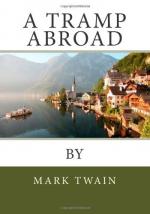Up to this point we had been in the heart of the William Tell region. The hero is not forgotten, by any means, or held in doubtful veneration. His wooden image, with his bow drawn, above the doors of taverns, was a frequent feature of the scenery.
About noon we arrived at the foot of the Bruenig Pass, and made a two-hour stop at the village hotel, another of those clean, pretty, and thoroughly well-kept inns which are such an astonishment to people who are accustomed to hotels of a dismally different pattern in remote country-towns. There was a lake here, in the lap of the great mountains, the green slopes that rose toward the lower crags were graced with scattered Swiss cottages nestling among miniature farms and gardens, and from out a leafy ambuscade in the upper heights tumbled a brawling cataract.
Carriage after carriage, laden with tourists and trunks, arrived, and the quiet hotel was soon populous. We were early at the table d’ho^te and saw the people all come in. There were twenty-five, perhaps. They were of various nationalities, but we were the only Americans. Next to me sat an English bride, and next to her sat her new husband, whom she called “Neddy,” though he was big enough and stalwart enough to be entitled to his full name. They had a pretty little lovers’ quarrel over what wine they should have. Neddy was for obeying the guide-book and taking the wine of the country; but the bride said:
“What, that nahsty stuff!”
“It isn’t nahsty, pet, it’s quite good.”
“It is nahsty.”
“No, it isn’t nahsty.”
“It’s Oful nahsty, Neddy, and I shahn’t drink it.”
Then the question was, what she must have. She said he knew very well that she never drank anything but champagne.
She added:
“You know very well papa always has champagne on his table, and I’ve always been used to it.”
Neddy made a playful pretense of being distressed about the expense, and this amused her so much that she nearly exhausted herself with laughter—and this pleased him so much that he repeated his jest a couple of times, and added new and killing varieties to it. When the bride finally recovered, she gave Neddy a love-box on the arm with her fan, and said with arch severity:
“Well, you would have me—nothing else would do —so you’ll have to make the best of a bad bargain. Do order the champagne, I’m Oful dry.”
So with a mock groan which made her laugh again,
Neddy ordered the champagne.
The fact that this young woman had never moistened the selvedge edge of her soul with a less plebeian tipple than champagne, had a marked and subduing effect on Harris. He believed she belonged to the royal family. But I had my doubts.




